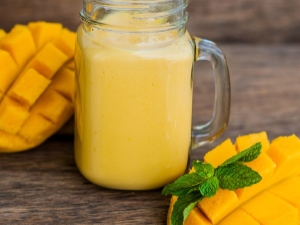Mango juice: properties and effects on the body

Among the drinks consumed by man, a special place belongs to fruit juices. Traditionally in Russia, apple and orange nectars are used. But mango juice also deserves attention, and before you try it, you need to know a number of nuances.

Features and Benefits
Mango juice stands out for its sweet taste with a tart note that most people appreciate so much. Its benefits and harms are due to its specific chemical composition. Mango contains almost the entire vitamin group B, which has a beneficial effect on the nervous system. If the amount of vitamins corresponds to the norm, fatigue is reduced and stress is more successfully reflected. Endurance increases, tone and mood increase, the limits of normal performance expand. Mango juice also contains vitamins:
- D;
- C;
- E.


Each of these substances is of great importance for immunity. Their role is also great for stabilizing the psyche and combating chronic fatigue. The condition of hair and bones, nails and skin improves. In addition to vitamin substances, a drink obtained from mango contains a fair amount of minerals, including such important ones as:
- Mg;
- P;
- Fe;
- Zn and some other chemical elements.

It is also worth considering that mango pulp contains organic substances, essential amino acids and a number of antioxidants. Thanks to them, aging is inhibited, which will inevitably please all people, regardless of their gender. It is noted that mango juice:
- slows down eye aging and age-related weakening of vision;
- it turns out to be a good prophylactic that prevents diseases of the cornea and retina, stopping their development;
- blocks the development of respiratory diseases;
- accelerates recovery from various inflammations and viral lesions;
- prevents the formation of blood clots in blood vessels;
- stabilizes blood pressure;
- reduces the likelihood of malignant degeneration of any cell in the body.


The benefits of mango for those suffering from impaired functioning of the kidneys and other organs of the excretory system have been noted. The substances present in the composition of these fruits counteract the exacerbation of urolithiasis and reduce the inflammation provoked by pyelonephritis. Other components increase the activity and effectiveness of thinking, help strengthen memory.
One of the latest discoveries is the release of a substance that helps reduce the risk of atherosclerosis. So a glass of mango juice a day for healthy people will help them maintain their status, and sick people will regain it.


How to do?
The ability to make mango juice with your own hands is quite valuable: as practice shows, a store-bought product does not always meet the necessary requirements. For the most part, a significant amount of sugar is introduced into it, and the drink itself is produced by recovery from dry matter. The easiest solution, of course, is to use a juicer. The pulp, previously cut into relatively small pieces, is passed through it.
You can bring the nectar to the condition by diluting it with a small amount of water, because it is very saturated with active substances and may even seem cloying, due to the large amount of sugars.


Drinking freshly squeezed juice is recommended within 180 minutes after receiving it.As soon as this period passes, a significant part of the benefit is lost. It is not recommended to drink fresh juice on an empty stomach. It is allowed to use it as a separate meal or ½ hour before it. In the absence of a juicer, juice is squeezed in a blender.
A small amount of water is an obligatory additive, and a certain amount of crushed ice should also be added to taste. When the mass is crushed, the juice is sometimes passed through a sieve to clear it of pulp. If it is needed, you can not do this. When drinking mango juice, one should not forget about the sweetness of even a diluted liquid rich in fast carbohydrates. Much depends on the quality of the mango, which is taken to obtain juice.
The softness of the fruit is desirable, but it should not be excessive. A fruit that spreads in the hand at the first touch will not be able to give good nectar. Ripeness is judged by firmness and heaviness. The peel of the fruit should be smooth and not leave unpleasant sensations when touched.

The output of mango juice from a kilogram of pulp can be very significant, in relation to the mass of fruits, it reaches 60-85% (depending on their moisture content, the method used and whether the product is de-pulped or not). In addition to drinking as an independent drink, this juice can be used:
- as part of summer fruit salads;
- for home baking;
- in desserts;
- in sorbets;
- in kissels and other culinary products.

Potential Harm
When preparing nectar on your own or buying it ready-made, it should be borne in mind that mango juices can bring not only benefits to the body, but also harm. The use of nectar obtained from unripe fruits can cause irritation of the gastrointestinal tract, provoke the development of colic.Therefore, it must be diluted with water. If you juice from a fully ripe fruit, this problem is not dangerous. But there is a risk of an allergic reaction, you may experience constipation and even feverish conditions.
Doctors believe that mango juice has no place in the diet of patients with colitis and gastritis. Pregnant women (subject to the normal state of the body and the absence of complications, the above contraindications) can drink nectar calmly. But this will have to be agreed with the doctor, since an allergy is likely to occur.
Particular caution should be exercised by those who already suffer from some other form of allergy or have not previously drunk juice. A similar approach helps to eliminate problems in baby food.

How to choose the right mango for juicing, see the following video.

















